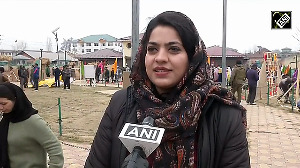Pointing out that political cycles have had a relatively muted impact on financial stability in India, Reserve Bank of India Governor Y V Reddy has said the country needs to put in place 'special defences' to face the prospect of volatile capital flows.
"While global financial integration does have beneficial impact, the volatility in capital flows can cause instability, specially if a country has not reached the threshold," Reddy said in his address at Zurich University in Switzerland.
Many emerging market economies do not seem to have adequate self-correcting market mechanisms in respect of such cross-border capital flows. In such cases, the capital flows at critical times reflect more of changes in risk appetite of the international investors than a country's fundamentals, Reddy said in his June 27 address.
"Hence, special defences need to be put in place for ensuring financial stability in case of countries like India that are faced with the prospect of volatile capital flows," he added in his speech released by RBI in Mumbai on Tuesday.
Reddy said issues relating to cross-border supervision of financial intermediaries in the context of greater capital flows are just emerging and these need to be addressed.
Referring to political picture in India, RBI Governor said socio-political preference for greater financial stability needed to be appreciated and the weight accorded to financial stability appeared to be higher than in some other countries, he added.
The RBI Governor, in the context of ongoing reforms in the financial sector in India, said the regulatory regime has also undergone certain fundamental changes.
New regulators like those for insurance and capital market have been created and focus on regulation has also changed, he said.
"The issues of regulatory co-ordination do arise often. However, the changes in the regulatory regime, meant for greater efficiency, may, on occasion, contain the risk of being a source of instability" he said.
"In India, we have been moving from government-dominated financial system to a market-oriented one. The relationship with government -- as the majority owner of financial entities, as the ultimate risk bearer in the system and as the sovereign in law-making -- is also changing in new environment," he said.
Reddy said: "In a way, in development of market-oriented financial system, RBI is what I may call a nurturing regulator as well as an independent regulator."
In the relationship with government, RBI emphasises on autonomy in operations, harmony with government policies and co-ordination in bringing about structural changes, particularly in respect of public ownership and legislative framework.
On having a single regulator, other than the central bank, and separating banking supervision from the central bank, he said, "I do not believe that the case of separation, which has become stronger in developed countries, should be transposed to developing countries."
Reddy said as a pragmatic measure, RBI has banking supervision under an independent Board for Financial Supervision (within RBI) while some sort of co-ordination is sought to be achieved through a high level co-ordination committee on financial and capital markets, consisting of financial regulators and Ministry of Finance, but presided over by RBI Governor.
Financial stability in India means ensuring uninterrupted financial transactions, maintenance of a level of confidence in the financial system amongst all the participants and stakeholders and absence of excess volatility that unduly and adversely affects real economic activity, Reddy said.
The major sources of real sector shocks in the country are very sharp rise in oil prices and extraordinary monsoon failures, he said, adding most of currency crises in developing countries occurred around the times of political elections, particularly in countries with the presidential form of government, he said.




 © 2025
© 2025